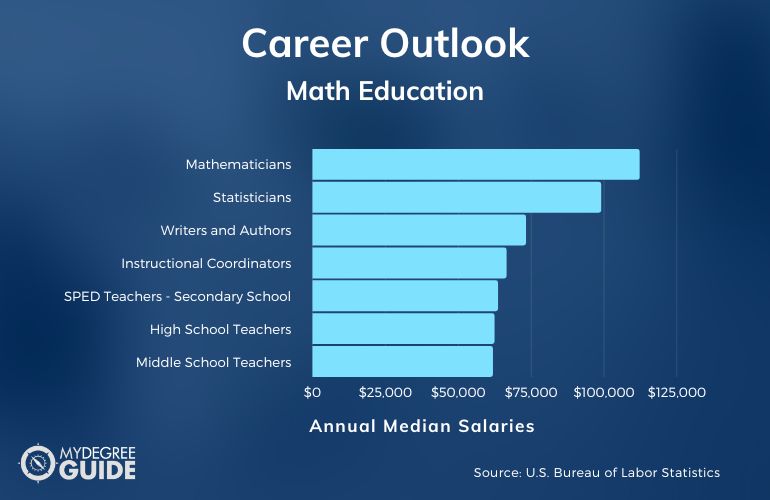A math education degree is a strategic academic path if you’re fascinated by numbers and want to share your passion for mathematical concepts with younger generations.

As a math education major, you’ll explore complex mathematical principles and pedagogical best practices. You’ll also learn about classroom management, theories of math education, and instructional strategies to support learners with different needs and backgrounds.
Editorial Listing ShortCode:
The courses you take, combined with a practicum and student teaching experience, can help prepare you to work as a math teacher, instructional coordinator, mathematician, or tutor.
Universities Offering Online Bachelors in Math Education Degree Programs
Methodology: The following school list is in alphabetical order. To be included, a college or university must be regionally accredited and offer degree programs online or in a hybrid format.
1. Arizona Christian University
Arizona Christian University offers a Bachelor of Science in Secondary Education with an emphasis in Mathematics. The curriculum aims to explore pedagogical research and how to apply it in practical ways in the classroom. Class sizes are small, which may allow for more mentorship from instructors.
Arizona Christian University is accredited by the Higher Learning Commission.
2. Bellevue University
Bellevue University offers a Bachelor of Science in Mathematics that includes the option to earn a Secondary Education Teaching Endorsement. The degree can be earned on campus or online. The curriculum covers real-world math applications, including data analysis and statistical modeling. Potential courses include Calculus I and II, Discrete Mathematics, and Linear Algebra.
Bellevue University is accredited by the Higher Learning Commission.
3. Central Methodist University
Central Methodist University offers a Bachelor’s in Secondary Education with the option to earn certification to teach mathematics in junior high and high schools. The program is available online and at multiple campus locations. The curriculum aims to develop creativity and problem-solving skills with the opportunity to participate in observation and field experiences.
Central Methodist University is accredited by the Higher Learning Commission.
4. Chadron State College
Chadron State College offers a distance education program to earn a Bachelor’s in Secondary Education. This program offers the option to become certified in mathematics for grades 6-12 in the state of Nebraska. The curriculum features experiential learning opportunities with the option to attend class meetings via video conferencing.
Chadron State is accredited by the Higher Learning Commission.
5. Concordia University – Wisconsin
Concordia University – Wisconsin offers the opportunity to earn an accelerated Bachelor of Arts in Secondary Education – Mathematics. The program uses a combination of in-classroom experiences and online courses. Courses are 8 weeks long. On average, the program can be completed in 3 years.
Concordia University – Wisconsin is accredited by the Higher Learning Commission.
6. Georgia Southwestern State University
Georgia Southwestern State University offers a Bachelor of Science in Secondary Education in Mathematics. This program may lead to eligibility for an initial teaching certificate in the state of Georgia. The curriculum provides the opportunity to participate in field experiences to learn effective teaching practices.
Georgia Southwestern State University is accredited by the Southern Association of Colleges and Schools Commission on Colleges.
7. Grand Canyon University
Grand Canyon University offers a Bachelor of Science in Math Education program. The degree may lead to initial teacher licensure. Courses are available both online and on campus. Courses are 7 to 15 weeks long. Potential courses include Christian Worldview, Calculus and Analytic Geometry I and II, and Social Justice for Educators.
GCU is accredited by the Higher Learning Commission.
8. Hamline University
Hamline University offers a BS in STEM Education with a concentration in Mathematics. The program provides the opportunity to assist faculty members with educational research and participate in collaborative projects at an elementary school near the campus. It may be possible to earn a Minnesota teaching license by completing 3 additional courses and student teaching.
Hamline University is accredited by the Higher Learning Commission.
9. Liberty University
Liberty University offers a BEd in Mathematics Education (6-12). On average, the program can be completed in 3.5 years. Courses use a convenient 8 week, fully online format. Student teaching and practicums can be completed locally. The program may lead to teacher licensure in the state of Virginia.
Liberty University is accredited by the Southern Association of Colleges and Schools Commission on Colleges.
10. Mayville State University
A BSEd in Mathematics Education can be earned through Mayville State University. This flexible, transfer-friendly program offers start dates in the fall, spring, and summer. All courses are available online. Graduates may be eligible to pursue licensure in the state of North Dakota.
Mayville State University is accredited by the Higher Learning Commission.
11. Mercy College
Mercy College offers a combined Bachelor of Science and Master of Science in Mathematics and Adolescence Education, Grades 7-12. With additional coursework, it may be possible to earn a dual certificate in Teaching Students with Disabilities. Courses are available online and at multiple campus locations. The curriculum aims to teach theoretical topics and practical skills through fieldwork experiences.
Mercy College is accredited by the Middle States Commission on Higher Education.
12. Miami Dade College
Miami Dade College offers a Bachelor of Science in Secondary Math Education. The degree requires an internship but may otherwise be completed fully online. Potential courses include Linear Algebra, General Teaching Skills, Methods of Mathematics, and History of Mathematics.
Miami Dade College is accredited by the Southern Association of Colleges and Schools Commission on Colleges.
13. Midway University
Midway University offers a Bachelor of Arts in Secondary Mathematics Education either online or on campus. The curriculum covers mathematics, literacy, natural sciences, and critical thinking. Graduates are typically prepared to pursue certification in Kentucky.
Midway University is accredited by the Southern Association of Colleges and Schools Commission on Colleges.
14. North Carolina State University
North Carolina State University offers a Bachelor of Science in Mathematics Education, which can lead to certification to teach either grades 6-9 or grades 9-12. Those pursuing the middle grades option can earn dual certification to teach science. The curriculum includes pedagogical coursework and field experiences. The student-teaching experience lasts 1 year.
North Carolina State University is accredited by the Southern Association of Colleges and Schools Commission on Colleges.
15. Ottawa University
Ottawa University offers an online Bachelor of Arts in Mathematics with a concentration in Secondary Education. Courses are designed to be flexible to fit various schedules. Potential courses include Discrete Mathematics, Linear Algebra, or Calculus I, II, and III. Each course is 8 weeks long.
Ottawa University is accredited by the Higher Learning Commission.
16. Pennsylvania Western University – California
Pennsylvania Western University – California offers a BSEd in Middle-Level Education with a concentration in Math. The program uses a blend of in-person and online instruction and may lead to Pennsylvania certification in grades 4-8. Classes are taught by faculty who have both terminal degrees and real-world experience in middle school classrooms.
PennWest – California is accredited by the Middle States Commission on Higher Education.
17. Texas Tech University
Texas Tech University offers an online Bachelor of General Studies that allows students to study various areas of concentration in equivalent depth. Mathematics and Education and Teacher Education are both possible areas of concentration. Advisers are available to help choose courses based on career goals.
Texas Tech University is accredited by the Southern Association of Colleges and Schools Commission on Colleges.
18. University of New Hampshire
The University of New Hampshire offers a BS in Math Studies with a teacher certification option. The program includes fieldwork experiences and courses such as Statistics, History of Mathematics, and Geometric Structures. The degree can be earned entirely online with select courses available on campus.
The University of New Hampshire is accredited by the New England Commission of Higher Education.
19. Valley City State University
Valley City State University offers a Bachelor of Science in Mathematics Education. Classes are available online with the option to attend real-time meetings. The school also offers the opportunity to add an athletic coaching certificate. Past graduates have had a 100% job placement rate.
Valley City State University is accredited by the Higher Learning Commission.
20. Western Governors University
Western Governors University offers an online Bachelor of Science in Mathematics Education (Secondary) that leads to teacher licensure. Terms last 6 months each, and on average, the entire program can be completed in 4 years. The program is flexible and allows for an accelerated pace through familiar material.
WGU is accredited by the Northwest Commission on Colleges and Universities.
Online Bachelor’s in Math Education Degrees

Math education programs provide a combination of practical skills and theoretical knowledge related to teaching math.
During this type of program, you can learn not only how to complete math problems and solve equations on your own but also how to explain them to others. While earning a bachelor’s degree in mathematics education, you’ll study a variety of subjects, including:
- Diversity
- Teaching technology and materials
- Calculus
- Algebra
- Probability and statistics
- Classroom management
- Assessments
Courses in these areas are designed to help familiarize you with advanced mathematical concepts and help you develop vital teaching skills.
You may also have the opportunity to select a degree concentration that is tailored to your career goals. Possible concentrations include pure mathematics, applied mathematics, secondary education, and elementary education. In addition to math and education courses, most programs require students to participate in classroom observations so that they can see working teachers in action.
Math education students also complete practicums and student teaching to gain real-world experience. These components of math education programs not only help students become more knowledgeable about the field but also help prepare them to apply for licensure.
Obtaining a state teaching license is an essential requirement to work as an elementary, middle, or high school teacher in most schools, especially public schools. After earning a bachelor’s degree in math education, you may qualify for positions with many kinds of employers, such as:
- Public schools
- Private schools
- Postsecondary schools
- Government agencies
- Tutoring centers
- Textbook publishers
These organizations often hire professionals with bachelor in mathematics education degrees to serve as teachers, instructional designers, or tutors.
These professionals use their knowledge and skills to create engaging and effective learning experiences for students. If you enjoy writing as well as working with numbers, you may choose to work as a writer who creates material for textbooks, math exams, and articles related to math education.
The mathematical skills you can develop during a math teaching degree may also help you qualify for a job as a mathematician or statistician. These experts conduct research and analysis for financial companies, government agencies, and colleges and universities.
Math Education Careers and Salaries

An online degree in teaching math serves as a solid foundation for a variety of professional roles. Schools, government agencies, and educational companies look for qualified mathematics educators to teach students and consult on academic policies, materials, and curriculums.
Many graduates of math education programs are teachers who instruct children and teenagers in how to solve problems and apply mathematical concepts to different scenarios. Others transition out of the classroom to serve as instructional coordinators or administrators.
According to the Bureau of Labor Statistics, these are the median salaries of some potential career paths for graduates of math education programs.
| Careers | Annual Median Salaries |
| Mathematicians | $112,110 |
| Statisticians | $98,920 |
| Writers and Authors | $73,150 |
| Instructional Coordinators | $66,490 |
| Special Education Teachers — Secondary School | $63,560 |
| High School Teachers | $62,360 |
| Middle School Teachers | $61,810 |
| Elementary School Teachers | $61,690 |
| Adult Basic and Secondary Education and ESL Teachers | $58,590 |
| Tutors | $36,680 |
Although many of the careers available to graduates of math education programs are based in schools, professionals in this area also work as independent tutors, academic consultants, and freelance writers.
Some graduates are also employed outside of school systems as mathematicians and statisticians who are responsible for data analysis and problem-solving. Data from the Bureau of Labor Statistics shows that the job outlook for these professionals is especially strong.
The projected growth rate for mathematicians and statisticians is 31%, which is much faster than the average for all occupations.
Math Education Bachelor’s Curriculum & Courses

The curriculum of a math education program usually helps students develop advanced mathematical knowledge while also building their teaching skills.
Common courses include:
- Content Instructional Design: In this course, you’ll learn about the process of developing courses, including creating learning objectives, instructional methods, and systems of evaluation.
- Calculus and Analytical Geometry: This class focuses on core principles of advanced mathematics, such as exponential, logarithmic, and inverse trigonometric equations.
- Introduction to Mathematical Reasoning: This course introduces students to key concepts, including proof by induction, set theory, symbolic logic, and basic algebraic structures.
- Linear Algebra: Students taking this class explore different aspects of linear algebra—such as determinants and abstract vector spaces—as well as its applications.
- Mathematics Learning and Teaching: In addition to understanding mathematics, students must also learn about teaching strategies, and this course presents information about resource selection and instructional planning.
- Statistics and Probability: This class teaches you about the elements of statistics and probability, including data representation, study design, and claim testing.
- Mathematics History and Technology: In this course, you can gain awareness of the historical development of mathematics and the technological tools that make modern mathematical achievements possible.
- Educational Psychology: Working with children and adolescents requires a thorough understanding of psychology and development, and this course exposes you to learning theories related to the needs of diverse populations of learners.
- Curriculum, Instruction, and Assessment: In this class, you can practice creating engaging and effective lessons, formal and informal assessments, and other instructional materials.
- Fundamentals of Diverse Learners: Learners have very different needs based on their past experiences and backgrounds, and this class helps math education professionals discover how to create learning environments that are supportive of all types of students.
Most programs also include student teaching experiences and professional portfolios as graduation requirements.
How to Choose an Online Math Education Degree Program

Math education programs often seem similar, particularly in terms of required courses. To determine which program is the best fit for you, it could help to evaluate these crucial factors:
- Program format. You can consider not only the types of courses that are required during the program but also how they’re delivered. Some schools offer asynchronous courses with pre-recorded lectures that students can view at any time, while others have synchronous classes that meet on specific days and times each week.
- Cost. When comparing math education programs, it’s helpful to note the full cost of the degree, including tuition, fees, and materials. In addition, you can research any available scholarships or financial aid programs that the school might offer or accept.
- Accreditation. Attending an accredited program is essential to becoming a licensed teacher. Most licensing boards only award teaching licenses to graduates of programs that are reputably accredited.
- Support services. Many colleges offer online support programs that are equivalent to those provided to on-campus students. You can check a school’s website for information about services such as tutoring, career counseling, and advising.
- Logistics. All bachelor’s of math education degrees require students to complete student teaching experiences. Online programs typically allow students to do their student teaching in local schools, but it’s beneficial to review this policy prior to enrolling.
If you’re struggling to locate any of these details about a particular program, you can reach out to an admissions counselor or financial aid specialist for help.
Admissions Requirements

Every math education program has criteria that applicants must meet to gain admission. These often include:
- Test scores. Some programs, but not all, require students to submit scores from standardized tests such as the SAT or ACT.
- Personal statement. Writing a brief essay gives you the opportunity to explain your interests and goals.
- Transcripts. You can request official transcripts from the schools you previously attended.
- Letters of recommendation. Former instructors can articulate why you would be a good fit for the program.
Some programs also require students to have taken and passed certain prerequisite math courses during high school.
Accreditation

Although accreditation is beneficial for every academic program, it’s especially critical for students pursuing degrees in education. Earning a degree from an accredited school is typically a basic requirement to become a licensed teacher within your state.
Regional accreditation is widely regarded as the gold standard because schools must meet a stringent set of standards to gain this accreditation status. This helps ensure that students get the most value out of their courses. It’s also usually easier to transfer credits from a regionally accredited institution, which may prevent you from having to repeat courses if you change programs prior to graduating.
Math Education Licensure and Certifications

Math education professionals who want to work in public schools must obtain a teaching certification in their subject area. The requirements for licensed teachers differ by state, but they universally include the completion of an accredited bachelor’s degree program in education.
The licensing requirements for many states include passing entrance exams and skills tests such as the PRAXIS. Most states also only grant licenses to applicants who have completed a student teaching experience in the field. Licensure also depends on the successful completion of a comprehensive background check, which is used to determine whether a prospective teacher has a criminal history.
Financial Aid and Scholarships

Many college students can’t afford to cover the upfront cost of tuition out-of-pocket. Fortunately, there are many sources of funding to help qualifying students pay for their degrees.
Filing a FAFSA is often the first step toward obtaining need-based financial aid. The FAFSA determines your eligibility for federal loans, grants, and work studies. If you’re enrolling as an in-state student, you may also qualify for state grants.
Scholarships are an especially valuable source of aid because they offer funds that students never have to repay. Scholarship programs can be based on a variety of factors, including your college major, background, extracurricular activities, and academic achievements. Many organizations also offer financial support to employees hoping to pursue higher education.
If you’re currently working, you can consult with your supervisor or human resources department to find out whether your employer offers a tuition reimbursement or assistance program.
What Is a Degree in Math Education?

A math education degree is an academic program that prepares students to work as math teachers, typically in middle or high school environments.
To accomplish this goal, math education students take courses in advanced mathematics concepts and teaching strategies. Modern math education requires teachers to find ways of engaging students’ interest while also providing them with essential knowledge.
During a math education program, you can learn how to successfully address the needs of diverse student populations and assess student progress. Before graduating, you’ll also be required to complete a student teaching experience that allows you to demonstrate your skills.
What Can You Do with a Math Education Degree?

For many students, the goal of earning a math education degree is to become an educator. Math teachers are needed at all levels of education, including middle school, high school, and adult basic and secondary education. Math tutors are also utilized for all ages of learners.
Teaching isn’t the only career option available, though. Other math education professionals work as instructional coordinators, school administrators, or writers. Math education majors who decide that they prefer to work outside the realm of education often pursue careers as mathematicians and statisticians.
Are Mathematics Teachers in Demand?

The demand for educators is expected to remain steady. Teachers at every level provide essential services to students, and math is an especially important area of education because of its applications across multiple disciplines.
According to the Bureau of Labor Statistics, kindergarten, elementary school, middle school, and high school teachers are all expected to see between 4% and 7% job growth over the next ten years. These rates are as fast as the average for all occupations. This translates to thousands of job opportunities. For example, there’s projected to be around 77,900 high school teaching positions open each year over the next ten years.
What Can You Do with a Mathematics Education Degree Besides Teaching?

The skills that you can develop while earning an online math teaching degree are also useful in a number of other employment areas.
Some graduates of these programs determine that they would prefer not to teach, and they instead work in alternate roles, such as:
- Mathematicians and statisticians
- Operations research analysts
- Actuaries
- Economists
- Data scientists
- Financial analysts
These positions tend to be more lucrative in the sense that they often have higher median salaries than teaching positions.
How Long Does It Take to Get an Online Bachelors Degree in Mathematics Education?

The amount of time it will take to graduate depends on your circumstances as well as the program’s structure. Full-time students attending programs with 16 week semesters generally complete their degrees within 4 years.
If you have transferable credits from another school, you may be able to graduate more quickly. In addition, some colleges and universities offer accelerated programs with 8 week semesters and year-round enrollment. Other obligations, such as work or caretaking responsibilities, make it difficult for some students to enroll in college full-time. If you attend college as a part-time student, it may take longer to finish your degree.
Is a Bachelor’s in Math Education Degree Worth It?

Yes, a bachelor’s in math education degree is worth it for many students. Math is a core subject for all students, so qualified math teachers are always needed.
For many educators, the value of teaching lies in the emotional reward of helping young students develop new skills. A math education degree is also versatile, allowing you to explore a range of career opportunities. In addition to teaching, you might pursue tutoring, curriculum design, or mathematics research.
Overall employment for education, training, and library occupations is expected to grow 7% over the next ten years (Bureau of Labor Statistics).
Getting Your Bachelors in Math Education Degree Online

Working as a math educator requires both a love of mathematics and an interest in sharing knowledge with others.
Over the course of your studies, you may become adept at solving math problems, explaining complicated concepts, and working in a classroom environment. Some math education professionals even go on to manage tutoring centers, serve as school administrators, or provide expertise as instructional coordinators.
Enrolling in a math education degree program could be the first step toward a fulfilling career. You can get started today by researching online bachelor’s degree programs in math education from accredited schools.
